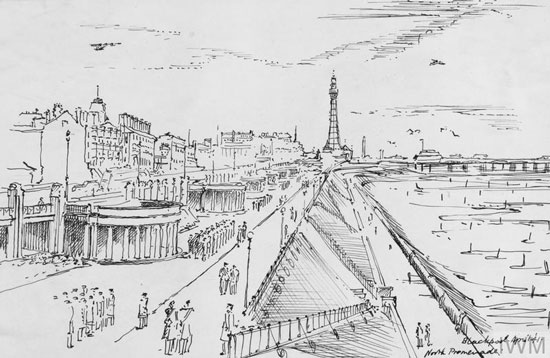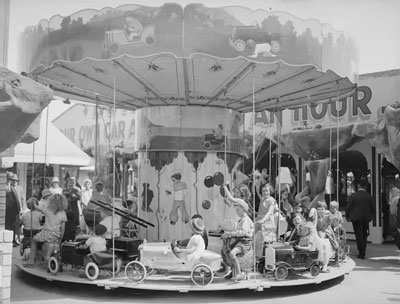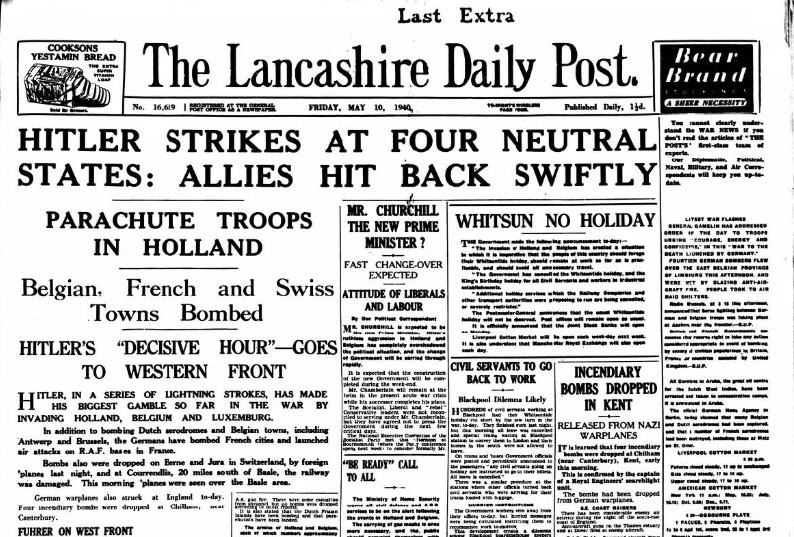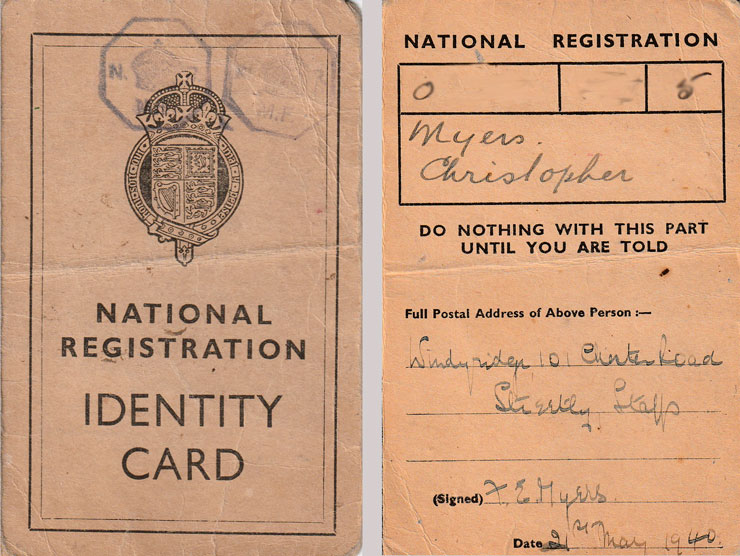STREETLY,
STAFFORDSHIRE
MEMORIES
(1936 - 1961)
A WEEKEND AT THE
SEASIDE
by Chris Myers
|
A WEEKEND
AT THE SEASIDE
Nothing
could be better than this. Nothing.
 I’d been
to the seaside before. Of course I
had. Lots and lots of times. Mummy
had told me. But the last time was
ages ago and I could only just
remember a stony beach because I'd
been there last August and now it
was another year and it was May. A
Friday. Nine months is a long, long
time when you’ve only
just had your fourth birthday.
Here was me, in the summer of 1938,
nearly two years ago now, on a beach
in Devon and I was probably feeling
the same feelings - but I can't
remember anything about it. I’d been
to the seaside before. Of course I
had. Lots and lots of times. Mummy
had told me. But the last time was
ages ago and I could only just
remember a stony beach because I'd
been there last August and now it
was another year and it was May. A
Friday. Nine months is a long, long
time when you’ve only
just had your fourth birthday.
Here was me, in the summer of 1938,
nearly two years ago now, on a beach
in Devon and I was probably feeling
the same feelings - but I can't
remember anything about it.
But
here I
was at the seaside again, now,
today, but this time I was standing
on another beach, a sandy one, which
stretched for miles and miles. There
was more open space than I had ever
seen before, enough to make me
breathless with wonder at the
vastness surrounding me. And the sea
stretching away for ever, blue and
sparkling. When I looked out over
it, the edge where it met the sky
was curved, which proved to me that
the earth was round, just like my
big sister had told me. Like a huge
orange, she’d said. She knew about
lots of things. It was a pity she
was so bossy-abouty. But at least
she was now helping me make a
sand-castle while our mum and dad
and elder brother lay back on the
sand in the afternoon sunshine,
relaxing after the long journey,
their hands behind their heads. They
were all squinting at the distant
horizon and seemed completely
wrapped up in their own thoughts.
The
sand-castle was finished. It only
needed the little tissue-paper flags
which had been bought especially
from a kiosk on the promenade, just
behind the beach. No sooner than I
had opened the packet, the dozen
little flags inside, which were the
national flags of more countries
than I knew existed, were grabbed
out of my hand by a violent gust of
wind, scattering and disappearing
totally, utterly, irretrievably.
This disaster was so unexpected and
so complete that I was numbed with
shock and did not even cry.
 In
fact I was surprised at my own
bravery. Still dry-eyed I soon found
myself trotting along the promenade
in the midst of the family, licking
a consoling ice-cream. I didn't
notice the lines of RAF men there,
practising how to stand to attention
and handle their rifles and march up
and down - my big brother told me
about all that a long time
afterwards. And also about why the
weekend ended up as it eventually
did. In
fact I was surprised at my own
bravery. Still dry-eyed I soon found
myself trotting along the promenade
in the midst of the family, licking
a consoling ice-cream. I didn't
notice the lines of RAF men there,
practising how to stand to attention
and handle their rifles and march up
and down - my big brother told me
about all that a long time
afterwards. And also about why the
weekend ended up as it eventually
did.
But what
I did see was something absolutely
wonderful, a toy I’d never seen
before, and that was a
multi-coloured windmill on the end
of a stick. It was tied to another
toddler's pushchair and was whizzing
around furiously in the breeze as it
passed by. The owner of the
desirable object was not even
looking at it and, unbelievably,
seemed to have an expression of
intense boredom on her silly face.
Perhaps even smugness. A sense of my
own recent loss and a desire to own
such a beautiful thing overwhelmed
me. Two quiet requests to my parents
were followed by a more forceful
plea which in turn led to a tantrum
which was one never to be forgotten.
But despite standing in the
grown-ups' path, barring their way
and screaming as loudly as I was
able, no windmill was going to be
bought for me and the world appeared
wholly bleak and cruel.
At
breakfast the next morning my
outlook had long since improved,
with thoughts of windmills and lost
flags dismissed and the world again
full of promise. I had the vague
impression that my cheery mood
contrasted with that of the other
four. They seemed to have lost their
high spirits of the previous day but
I had no idea why. I finished my
boiled egg and, bored with a serious
conversation I could not follow,
left them to their muttering and
slipped off the tall hotel chair.
Then down to the floor and under the
table where an exciting new
territory opened up. As I crawled
amongst the legs, both human and
oak, I felt some surprise that for
once no notice was being taken of
such behaviour in a public place. By
the time that I had re-emerged,
tired of this normally forbidden
activity, the discussions had ceased
and I was told, gently, that they
had all decided it would be better
to return home that morning, rather
than to stay on to Sunday as they
had intended. Daddy would go and get
the car filled up while the rest of
us had a last look at the sea.
 On
the promenade I was persuaded,
against my better judgement, to
accept the treat of a ride on a
children’s roundabout (a bit like
this one). I was lifted into a small
car, painted pink. I grasped the
steering wheel and was overcome with
self-consciousness as I found myself
going round and round in front of a
ring of grown-ups. These mums and
dads all seemed to be watching the
children on the roundabout ever so
intently. But I knew that it was
just me they were all looking at. I
bowed my head, overcome with
self-consciousness, and sat for an
eternity with my eyes focused on a
sheet of metal in front of my knees
beyond the steering wheel. It was
like a tiny, enclosed world, painted
pink, just like the maps of the
British Empire, and flecked with
rust. Round and round and round.
Finally and to my immense relief the
ride came to an end. I was lifted
out of the car and then I snuggled
up to Mummy where at last nobody
seemed to be looking at me. She put
her arm around me and seemed to
press me to her side even more
closely than she normally did. On
the promenade I was persuaded,
against my better judgement, to
accept the treat of a ride on a
children’s roundabout (a bit like
this one). I was lifted into a small
car, painted pink. I grasped the
steering wheel and was overcome with
self-consciousness as I found myself
going round and round in front of a
ring of grown-ups. These mums and
dads all seemed to be watching the
children on the roundabout ever so
intently. But I knew that it was
just me they were all looking at. I
bowed my head, overcome with
self-consciousness, and sat for an
eternity with my eyes focused on a
sheet of metal in front of my knees
beyond the steering wheel. It was
like a tiny, enclosed world, painted
pink, just like the maps of the
British Empire, and flecked with
rust. Round and round and round.
Finally and to my immense relief the
ride came to an end. I was lifted
out of the car and then I snuggled
up to Mummy where at last nobody
seemed to be looking at me. She put
her arm around me and seemed to
press me to her side even more
closely than she normally did.
We walked
back to the hotel where Daddy had
already put the suitcases in the
car. As we drove off I gave the sea
a final wave, as Mummy told me to
do, and promised it I would come
back as soon as I could. I nestled
up beside my sister on the rear seat
and looked sadly out of the window
at the houses and shops which lined
the road out of Blackpool.
As we passed a newsagent's there
were some newspaper hoardings outside,
left over from the previous evening.
They told us the headlines of last
night's final edition. If I had been able to read
any of this -
and understand it - it would
have told me:


No one
spoke.
The little black Ford headed
south, towards Birmingham and
Streetly.
Towards home and safety.
**********
|
POSTSCRIPT
The days after our return
home from our weekend away
are frightening indeed - but
not to me, who is cocooned,
protected, and so,
thankfully, knows nothing of
them.
We get back to Streetly on
the Saturday afternoon. By
the following Tuesday,
Rotterdam is being heavily
bombed and German forces are
pouring into eastern France
- "Blitzkrieg", lightning
war, the frightening new
tactic of fighting. In the
evening, the Minister of
War, Anthony Eden, announces
on the wireless the
formation of a new defence
force, the Local Defence
Volunteers (soon to be
renamed the "Home Guard").
My father volunteers
immediately, together with
dozens of other Streetly and
Little Aston men, many of
whom are survivors of the
Great War and whose memory
of war is still recent and
fresh and ghastly. They are
joined very quickly by my
elder brother who has, as
yet, no experience of it.
On Wednesday the Dutch Army
surrenders. On Friday
Brussels falls.
The following Monday sees
the Germans reaching the
Channel coast, cutting the
Allied armies in two. The
British Army is in retreat
towards the port of Dunkirk.
Miraculously the German army
halts for a day or two in
order to re-group and the
Luftwaffe takes over the
role of attacking the
hundreds of thousands of
troops being forced back
into the sea.
And finally, on Wednesday,
May 21st, ten days after our
curtailed weekend by the
seaside, my mother sits down
at the dining table to fill
out a small buff-coloured
form. As I look now at that
little object, 84 years
later, I visualise her on an
occasion such as this,
leaning forward to dip her
blunt-nibbed pen into the
bottle of Stephens ink and
then, ever so carefully,
filling in the information
which has to be included. As
is always the case when she
is writing something
important, the tip of her
tongue is in the corner of
her mouth as she gives her
full concentration to the
task in hand and the
avoidance of any error. A
quick check that the address
information is correct, the
pen is laid own, a dab of
blotting paper and the job
is done.
 |
Within days, by June 3rd,
the miracle of the Dunkirk
evacuation is completed but
during the month things get
ever worse. On the 10th
Italy declares war on us,
Paris falls on the 14th and
France surrenders on the
21st making its entire
Channel coastline available
to invasion forces and
behind it a string of
Luftwaffe bomber bases
within range of all the
British Isles.
I
think of my parents and what
was going through their
minds at this time as they
faced this total disaster
and a new, terrifying,
ongoing threat. Every
Streetly family, every
family in the land, was in
the same position. WHAT must
it have been like to be
someone who was responsible
for children at that time?
How would any of us have
coped with it all?
Perhaps it does none of us
any harm to think of these
things, just very
occasionally.
CM....30 June 2024
|
**********
(Main article originally written in 2003 and
remembering Friday and Saturday, 10/11th May 1940)
ACKNOWLEDGEMENTS
Please see INDEX page for
general acknowledgements.
Grateful acknowledgement is also made to:
-
The Imperial War Museum (sketch of
North Promenade)
- Blackpool Gazette
(Road scene)
- The British Newspaper Archive
(Newspaper headlines)
- family members
This
family and local history page is
hosted by
www.staffshomeguard.co.uk
(The Home Guard of Great Britain,
1940-1944)
All
text and images are, unless
otherwise stated, © The Myers Family
2024
|
INDEX
Home Guard of Great Britain
website
|

|
INDEX
Streetly and Family Memories
1936-61
|
L8A3
June 2024
-
© The
Myers Family 2024


| |